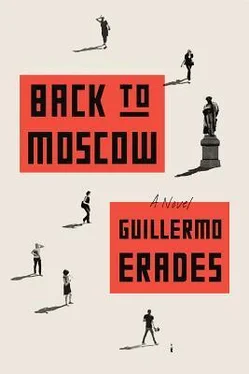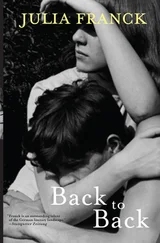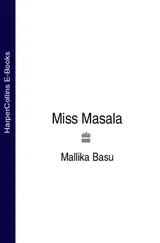‘He has his moods. That’s true.’
‘I would like to have children one day. And I want a man who brings money home, a man who’s hard-working and resourceful.’
‘Sergey is going through a rough patch,’ I said, ‘but he’ll find a job. It’s not all about money.’
‘Of course it’s not all about money.’ Ira buttoned her cardigan all the way up. ‘The problem is not that Sergey doesn’t bring in money. The problem is that he doesn’t care about it. He’s happy living at his mother’s old flat, off my salary. He says we don’t need anything more. He has no ambition. I love Sergey very much but I can’t stand this situation any longer. I have to think about my own life.’
‘And where does the American guy fit in all this?’
‘Rob makes me feel good about myself.’
The girl with the red lipstick stood up, smiled at me again, and walked towards the toilet.
‘Excuse me,’ I said, getting to my feet, ‘I’m going to wash my hands.’
Ira glanced behind her, at the table where now there was only one girl. She looked back at me, shaking her head.
‘Martin, I really like you. But you are such an asshole.’
POLINA LIVED WITH HER parents in the south of Moscow, half an hour away from the last metro stop on the red line. When she came to my place, she would tell her mother she was staying with a girlfriend of hers. In the morning she would leave early to go to school.
She didn’t talk much, Polina, but she seemed to enjoy the time we spent together. She smiled a lot, which was unusual in Moscow, and listened carefully to everything I said, always in awe, as if I were a professor giving a lecture. Unlike Lena, Polina never corrected my Russian, and even looked embarrassed when I asked her for a clarification or to repeat something she’d said — as if it were unforgivable for her to have used a word or expression that I didn’t know. I attributed this to our difference in age.
One day when I had nothing to do, I asked her to come over.
Klassno , she texted back. I’ve missed you. Will be there in two hours .
I hadn’t seen her for a week or so. I had spent the morning in Coffee Beans and, on the way back home, I had bought a pirate DVD at the perekhod, an American romantic comedy, the kind of film Polina liked.
I took a shower, changed the bedsheets on the couch and started to prepare a salad for dinner. I was chopping vegetables when I heard my phone beep. Surely Polina, I thought, perhaps she was running late. Picking up the phone, I was shocked to see Lena’s name on the screen. It was the first time I’d heard from Lena since she’d left my flat on the first night of snow.
Privet, can I come to your place tonight?
My first thought was that it was an old message that, for some technical reason, got stuck somewhere. But I couldn’t help feeling anxious about the possibility of seeing Lena again. The image of Lena’s sensual body — so different from Polina’s — flashed into my head. My heart was beating fast.
I replied: Sure, come over .
Less than a minute later I received a text back. I’ll be at your place around eight .
I immediately called Polina to cancel our date. But now Polina’s phone was out of reach, she was probably on the metro. Anxious, I kept calling every few minutes, hoping to catch her before she got to the centre. Her phone seemed to be switched off.
At seven thirty, Polina showed up at my flat, with the pink backpack she always carried full of schoolbooks and clothes for the next day. In one hand she held a bottle of wine.
She kissed me, smiled. ‘I’m so happy to see you. I bought Georgian wine at the corner shop. I’m starving, what are we having for dinner?’
I didn’t know how to tell Polina that I needed her to go back home, that she couldn’t stay at my place.
I decided to be honest. She deserved that.
‘Polina, a friend is coming to see me tonight,’ I said, regretting, not for the first time, the gender specificity that the Russian language required. Podruga meant female friend.
Polina stared at me in silence.
‘I’m so sorry,’ I went on, ‘but I shouldn’t have asked you to come tonight.’
‘What do you mean?’
‘I’ve been trying to reach you. Your phone wasn’t working.’
Polina looked confused, her smile was gone. She didn’t seem to understand what I was saying.
‘This friend,’ she finally said, ‘is she like a girlfriend?’
‘No,’ I said. ‘Well, an old girlfriend. I haven’t seen her in a long time.’
Polina’s lips started to tremble.
‘Polina, I’m really sorry.’
I grabbed her little shoulders. Her cheeks were red. She stepped away from me, picked up her pink bag from the chair.
‘I really like you,’ I said, ‘but, you know, I have a thing for this other girl.’
Polina was now covering her face and sobbing, like a child.
‘The thing is,’ I said, ‘I met her before I met you.’ I thought this would somehow make things more understandable for Polina. ‘It’s mostly sexual attraction. Nothing serious, really. I like you, Polina.’
Polina went to the entrance of the apartment and tried to open the first door, but her hands were shaking — she could not turn the key.
‘Why don’t we meet tomorrow?’ I said. ‘We can go to TGI Fridays, and then to the cinema.’
Polina finally managed to open the door. She turned round.
‘You are cruel,’ she said.
Then she left.
Lena arrived an hour later. We hardly talked. After removing her hat, scarf, shoes and coat, Lena continued with the rest of her clothes, sweater, shirt, bra, jeans. She stood in the corridor, silent — wearing nothing but her necklace, her blonde hair uncombed, her breasts whiter than I remembered. Then she kissed me.
Thirty minutes later we were lying on the couch in silence. I was staring at the tapestry on the wall — at Ganesh’s elephant head and his useless little brush. I didn’t know what to say. Somehow, despite all the anticipation and all the longing that had built up over the weeks, being with Lena didn’t feel as good as the thought of being with Lena. I could not understand why, but her body could not fill the emptiness inside me.
Then Lena dressed, kissed me goodbye, left.
I closed the doors and stepped into the kitchen. At the sight of Polina’s bottle of wine, a black void grew in my chest and sucked the air out of my lungs. I let myself fall onto a chair and covered my face, surprised to find a tear rolling down my cheek.
IN WINTER I WOULD OFTEN walk along Bolshaya Bronnaya, turning right into Malaya Bronnaya, keeping to the edge of the pavement where the snow was fresh and crunched under my feet. It was a beautiful walk along the quieter streets of the centre and I would focus my mind on the frozen air flooding my lungs, then steaming out my mouth in small white clouds. After fifteen minutes I would reach Patriarschiye Prudy.
I would stroll around the frozen pond, where children played with sleds or hockey sticks. Then I would walk back through Mayakovskaya into Tverskaya, descending towards Pushkinskaya and, often, when the cold had seeped through my many layers of clothing and had reached my bones, I would enter the Revolution Museum, which was always empty but warm. I would leave my coat, scarf, gloves and hat in the cloakroom, get a hand-cut ticket from a babushka at the entrance and wander into the exhibition galleries.
I passed through the initial halls, which contained old soviet flags, newspaper clippings and photos of Lenin, and walked straight into the rooms with soviet propaganda posters from the 1950s and 1960s, the wooden floors creaking under my feet. The museum had long lost its purpose, but there was a church-like tranquillity about it. I was usually the only visitor among the cleaning ladies and unsmiling dezhurnayas.
Читать дальше












